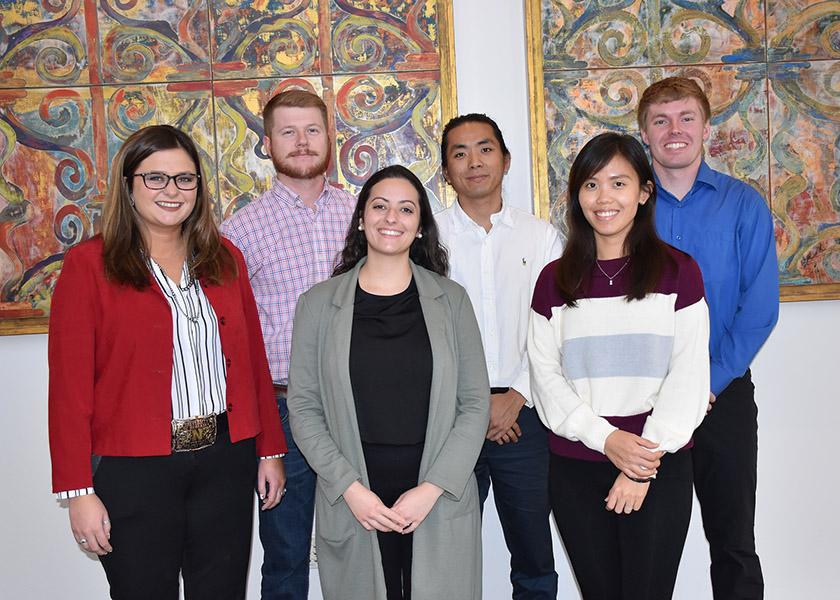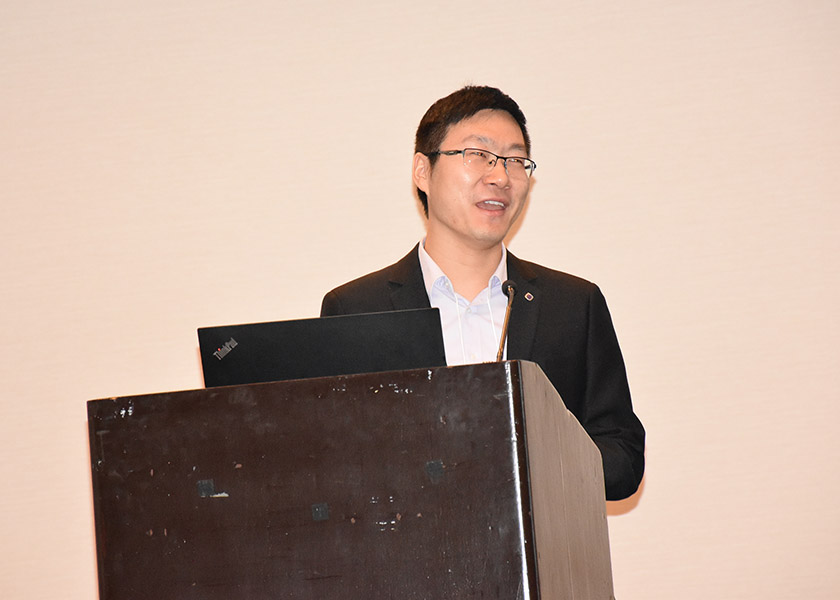NSIF Lightning Talks: Top Swine Genetics Students Take the Stage

From disease resilience to swine behavior, seven graduate students from across the country presented their research at the National Swine Improvement Federation (NSIF) meeting in St. Louis, Mo., on Nov. 30. NSIF’s goal is to recognize students conducting research in the area of swine genetics, meats, nutrition or other disciplines that may have a swine genetic component.
“Mark” Jian Cheng of Iowa State University was honored with the Lauren Christian Graduate Student Award, a $500 award recognizing an outstanding swine animal breeding and genetics graduate student.

“Mark” Jian Cheng of Iowa State University. Photo by Jennifer Shike.
“Pork is the most consumed animal protein in the world. However, the pork industry faces unprecedented challenges from diseases. Exposure to disease reduces production efficiency and carcass quality, increasing cost of production; increases use of antibiotics, and reduces animal wellbeing,” Cheng said.
His research has explored opportunities to improve the overall resilience of pigs to a broad array of common diseases through genetic selection using deep phenotyping and genotyping data collected from a natural polymicrobial disease challenge model.
He found disease resilience traits were heritable and can, therefore, be selected for. Resilience indicator traits derived from feed and water intake patterns can be used for selection of more resilient pigs. A challenge load was developed using growth rate under challenge and clinical disease traits, such as treatment rates, mortality rates, and subjective health scores.
“Reaction norm models identified genetic variation across different challenge loads developed and can be implemented to select more resilient animals across different challenge load, or of high-performance animals at a given challenge load, or a combination of these,” he said.
Multiple important quantitative trait loci (QTL), including major histocompatibility complex (MHC), were identified for disease resilience and immune response traits. Genetic indicators derived from feed and water intake patterns, reaction norm models using the developed challenge load, and QTL and genetic markers identified, along with genomic prediction, can be used to facilitate the genetic progress of disease resilience, he explained.
Doug Newcom, vice president of global technical service at the National Swine Registry and NSIF award committee chairman, said, “NSIF wants to encourage and reward students for their commitment to sound genetic principles and for the discovery of new concepts concerning genetic improvement.”
Six other students received Pork Checkoff Graduate Student Travel Awards. Here’s a quick look at the award-winning projects.
Sungbong Jang
Ph.D. candidate in Animal Breeding and Genetics at the University of Georgia
Sungbong has gathered vast experience in working with large sequence and transcriptomic data to help improving accuracy of genomic predictions. He has just started his third year of Ph.D. and is currently working on three different pig projects. The projects are using sequence data to improve genomic predictions for terminal and maternal lines in pigs, multi-line single-step genomic evaluations using unknown parent groups and metafounders in pigs and multi-line single-step genomic evaluations using pre-selected markers from sequence data in pigs. He is also working on the impact of the dimensionality of genomic information on genome-wide association (GWA), which reveals that issues in finding causative variants are related to the effective population size and sample size used in GWA. This study explains an issue that has been present for years in livestock and human populations.
Natalia Galoro Leite
Ph.D. student in Animal Breeding and Genetics at the University of Georgia
Leite currently carries three research projects and collaborates on two other projects. In her research, she mainly focuses on fine statistical modeling for the evaluation of aggressive behavior in pigs and on the genetic relationship of aggressive behavior with the Swine Inflammation and Necrosis Syndrome (SINS) and other important production traits. Other projects Leite is involved include the evaluation of the inclusion of crossbred information in big genomic evaluations, protocol development and genetic selection for survival traits, and causal variant selection using genomic-wide association studies.
Savannah Millburn
Master’s student in Animal Breeding and Genetics at the University of Nebraska-Lincoln
Millburn’s research utilizes the NUtrack animal monitoring system at the University of Nebraska-Lincoln. NUtrack is a deep-learning, computer camera system that can identify and track individual animals within a pen. Behaviors that NUtrack can identify include incidence of sitting, standing, laying, time at the feeder/waterer, distance traveled and average walking speed. She will be using NUtrack to identify early-life social behavior in pigs. Her goal is to analyze the connection between behavior during the growing stage and mothering ability of sows. From this, she hopes to identify traits that can be used to select replacement females at an earlier phase of life.
Dalton Obermier
Ph.D. student in Animal Breeding and Genetics at the University of Nebraska-Lincoln
Obermier is studying toe growth and wear in sows. Sow mortality numbers continue to be a concern for producers across the country and lameness is the second leading cause at a rate of approximately 30% of the total mortalities. Many factors play a role in lame sows, with excess toe length being one of them. In University of Nebraska-Lincoln’s ongoing project, they are evaluating toe growth, toe wear and total toe length from the end of gilt development throughout parity 4 on both front and back feet. Using a wood burning tool to mark the toes allows Obermier to track how much the toe is growing and/or wearing across the following time points of each parity: Day 57, Day 100 and Weaning. Early results have shown a cyclical upward trend in total toe length throughout the sow's reproductive lifetime, with exponential growth taking place from the midpoint of gestation throughout weaning and rapid wearing from weaning back to the midpoint of the following gestation. Obermier believes there are many applications in both research and development and practical application on the farm that can result from this research after further repetition.
Zack Peppmeier
Ph.D. student in Animal Science at North Carolina State University
Growing up on a diversified livestock farm in southern Iowa and through a number of different job opportunities, Peppmeier has been able to gain experience in both the live and meat side of swine production. His research consists of the development and application of technologies to assist in the production of swine. This is typically referred to as precision livestock farming. He is currently developing a computer algorithm that can automate the process of capturing backfat and loin depth from ultrasound images. The goal is to increase the accuracy of measurements taken and free up labor so workers can focus on other areas of production. He hopes to use his knowledge of the swine industry in combination with his current research to help bridge the gap between those developing technologies and the producers using the technologies at the farm level.
Swan Tan
Ph.D. Candidate in the Infectious Diseases program at the University of Georgia
Tan’s research projects mainly focus on developing and applying computational tools to address swine influenza and to further understanding of T cells immunity in swine health. Her other goals include aiding pig farmers to select which vaccine would be the best based on T cell epitopes conservation. One of her published studies entitled “Quantifying the Persistence of Vaccine-Related T Cell Epitopes in Circulating Swine Influenza A Strains from 2013–2017” highlights a method to assess the degree of T cell epitopes conservation between existing vaccines and circulating strains that could potentially contribute to the prediction of swine vaccine efficacy. Additionally, when a new IAV reassortant emerges, she said she would be interested to find out whether existing swine vaccines might be effective to combat the spread of the new virus. This led to another work in progress, “H1N1 G4 swine influenza T cell epitope cross-conservation analysis uncovers potential risk to swine and humans,” proposing on measuring T cell epitope content relatedness of vaccines and the emergent H1N1 G4 swine virus (G4), as well as field strains. Using a similar approach, she is applying computational algorithms to assess G4 virus and found interesting results that U.S. swine population may be susceptible to the emergent G4. Both of these studies’ findings reflect the feasibility of their approaches in evaluating vaccine T cell epitopes content conservation and could possibly provide valuable contribution not only to pig health but also to pork producers.
More from NSIF 2021:
Quoteworthy: How Swine and Poultry Leaders Drive Genetic Improvement







